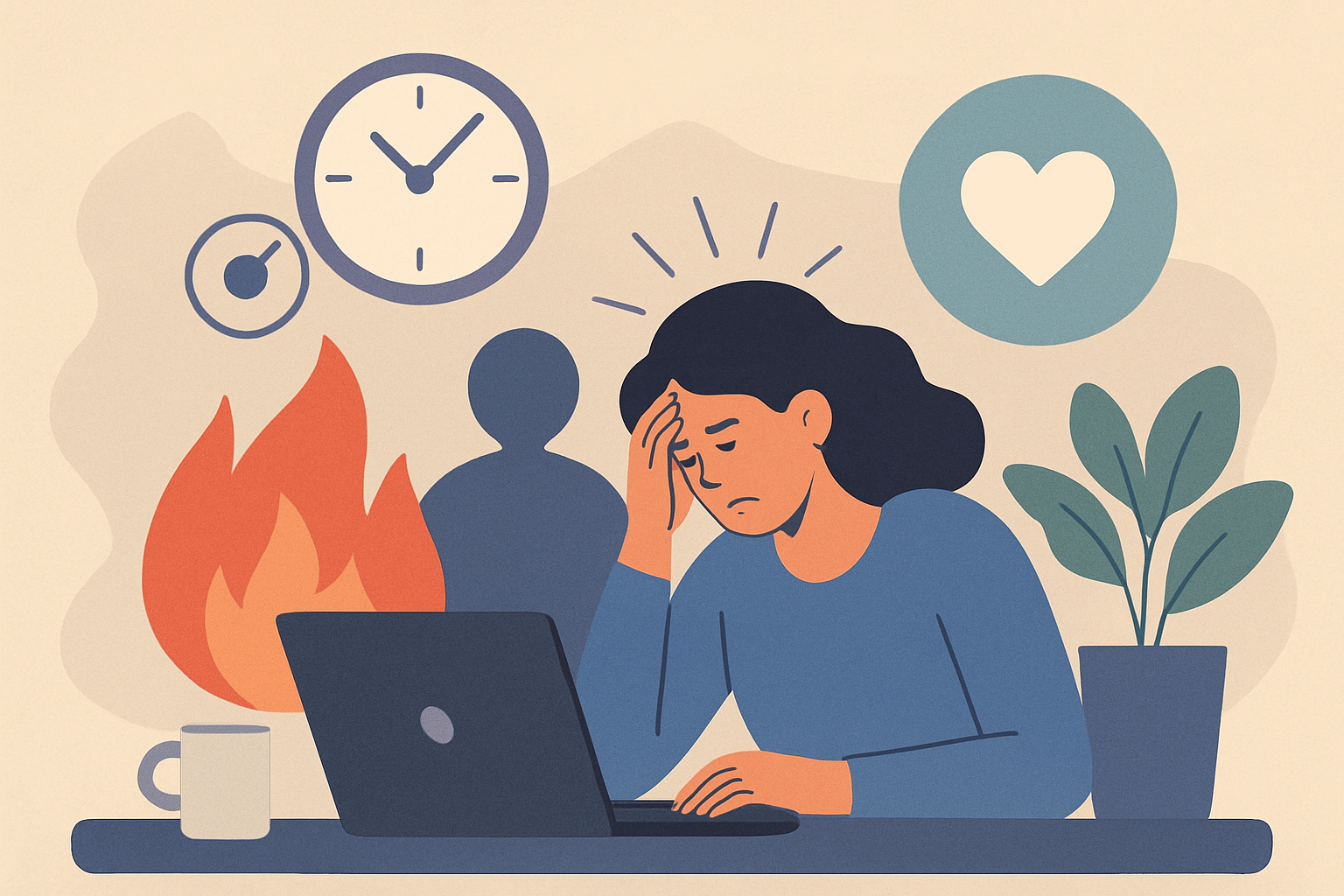6 Self-care apps for researchers

Everyone in and around the researcher community is aware of the stresses of the “publish or perish” culture. Alongside that exist other problems that researchers have to navigate on a regular basis— accepting failure, focusing consistently, funding, balancing the personal and professional demands of their lives, etc. All these can lead to mounting stress and anxiety for those not able to constantly adapt to adversity. Additionally, the absence of adequate systemic support can make it harder for researchers to cope with the pressures they constantly experience. This could be felt more severely by those who already struggle with mental health issues. We have come across story after story of how difficult academia is for those who struggle with their mental health.
“Practice self-care”— this is something we hear so often these days, but many who have not been lucky enough to practice it from childhood may find it to be just another box waiting to be ticked off a checklist. Drink enough water in a day, exercise, eat heathy… these are not things that come naturally to many. Additionally, if the demands of your social, academic, professional, and personal life are many, you might not end up taking care of your own needs and desires. This could take a toll on you. Over time, the smaller, momentary experiences of stress or anxiety could pile up and begin to affect your overall well-being. If you are not in a position to ask for professional help, or cannot find the kind of help you want, what can be an alternative first step in taking care of yourself in a more holistic way?
Here is a list of 6 self-care apps that can help you navigate difficult experiences, mind states, and emotions and live life at your own pace and comfort.
1. Habitica
Size: 8.5 mb
This cute little app is designed like an RPG (role playing game). You get to create your own avatar and progress through a gamified model of habit formation. On signing up, you are asked to choose which areas you want to focus on (these include, among others, work, exercise, creativity, etc.) and you are allowed to choose as many as you want. Once you are done picking, Habitica suggests a list of tasks that you have to complete every day. You can edit the existing tasks and add your own ones. Your avatar, like in most games, starts off with full health that declines if you do not practice your habits consistently. As you gain more experience and maintain your health, you move up levels. The further ahead you are, the more features you can unlock. The game has features such as time-travelers and pets, and the gold that you earn in the game can be used to buy in-game features. If you want an engaging app to help keep you accountable — be it with daily writing, making time for your loved ones, or eating a little healthier, Habitica is a good app to start with.
Available for: iOS, Android
Price: Free; subscription also available
2. SuperBetter
Size: 4 mb
SuperBetter is another gamified, habit-building app that asks you to complete three power-ups and quests and battle one bad guy per day, to get your daily dose of a “SuperBetter multivitamin.” Power-ups are activities that boost your mental, emotional, and/or physical resilience. For example, “Drink a glass of water” will boost your physical resilience, while “Give yourself a hug” will boost your emotional resilience, and so on. At the bottom left of the screen is your current level and resilience. You start off with 1 resilience in level 1. You progress in the game and stay healthy as you keep finishing your daily dose of the “SuperBetter multivitamin.”
This is a good app to try and balance your daily routine. You will be forced to include a task for each area of your life — so you may need to allocate time for your research work but you will also have to give yourself time for some things that you enjoy and new hobbies or skills that you might want to pick up.
Available for: iOS, Android
Price: Free
3. Sanvello
Size: 48 mb
When I started looking across websites and platforms for mental health apps that I could recommend to researchers, I found that Sanvello came heavily recommended. Additionally, pn Google Playstore, it is listed under “Editor’s Choice.” Curious to find what the hype was about, I downloaded the app. Before I could reach the registration page, Sanvello asks me to pick from a set of themes (such as waves, forest creek, etc.) which I’m informed can be changed later; choose up to three areas I would like to focus on — for example, “feel happier,” “think positively,” etc.; and choose a particular time of day (morning or evening or any unspecified time) when I will take some time out for myself. This translates to me using Sanvello, of course. I picked a time and found that Sanvello had sent me a notification at that time, the next day. I had to fill out a mood tracker for the day, check in on my emotions, and was led to my home page, where there was a recommended, curated list of things waiting for me. This curated list was based off of a questionnaire that Sanvello has made me fill out to test my depression, stress and anxiety.
I also found that Sanvello provides the option to clinicians to have access to their patients’ data, if the patient be willing. To clarify, if a user joins Sanvello and their mental health professional provides them with a code for Sanvello (which is given to mental health professionals on the Sanvello for Clinicians), and they use that code to voluntarily keep their mental health care provider in the loop, then the clinician is in sync with the data that is filled out by the user every day. However, this feature is only available in the US.
Sanvello’s curated lists come with suggested reading, practices, and Spotify playlists designed for each user’s particular mood and situation. If you are looking for a mix of resources to help you navigate your mental health daily, Sanvello is a good place to be.
Available for: iOS, Android
Price: Free; subscription available
4. Simple Habit
Size: 248 mb
As a regular user of this app, I would recommend Simple Habit to anyone. Unlike the other apps on this list, it does not tackle mental health issues directly. Instead it aims to bring mindfulness into everyday life. The app encourages everyone to meditate for only five minutes a day. Yet again, the focus of this app, like the others on this list, is on consistency and making a small change that you keep practicing every day.
There is a growing library of guided meditation courses provided by over 100 teachers and therapists who practice and encourage others to meditate. The app also has an “SOS” option on the radial dial on its “On the Go” page. In a moment’s notice, anyone (free or premium users) can access the short guided meditation courses that are available under “SOS” such as panic attack, depressed, in pain, etc. Apart from this feature, the “On the Go” page offers short sessions for those who may want to practice mindfulness while they are travelling or taking a short break between tasks.
If you are stressing before a paper presentation or worrying constantly about the latest results about your study, now might be a good time to hit the “SOS” button and do a quick meditation session.
Available for: iOS, Android
Price: Free; subscription available (allows users to download content for offline use)
5. Stop, Breathe and Think
Size: 12 mb
Similar to Sanvello, Stop, Breathe and Think is also an Editor’s Choice app on Google PlayStore. Unlike the other apps on the list, this one lets you browse without signing up or registering. So, if you are unsure about if the app is a good fit for you, you can just do a walkthrough.
You are asked to specify how you feel physically and emotionally, after which the app provides you with short listening courses, which you can think of as mindfulness courses. The courses are available in English, Spanish, or Greek. However, the Greek option is available only to premium users.
It also allows users to practice unguided meditation or breathing exercises, by providing them with a self-meditation timer. This is a no-frills app that can let you focus on bettering your health through meditation and breathing exercises. As you practice daily, you earn stickers and get to keep track of your moods over a period of time.
Available for: iOS, Android
Price: Free; subscription available
6. The Safe Place
Size: 2.8 mb
The “About the app” segment of the app talks about how there is a serious lack of awareness about mental health in the Black community. The Safe Place is designed to educate the Black community in America regarding their mental health.
The app is divided into segments such as the #HowBlackDoesItFeel Project, Black mental health statistics, inspirational quotes, self-assessment questions, inspirational Black quotes, videos and podcasts, mental health resources, classes and books.
If you are a part of the community and feel like academia does not have the necessary insights to understand your struggles, do not despair. You can start with this app, which is an effort to let those who are struggling with mental illness in the Black community know that they are not alone.
Available for: iOS & Android
Price: Free
So, these were a few apps that I thought could help you get in the mood to start taking care of yourself. Maybe you aren’t able to make enough time away from research to focus on yourself. You could start now, and here. However, if your struggle with mental health is persistent, it might be good to go beyond apps and reach out to a mental health professional. In the meantime, hold on, ask for help when you can and trust that there are a lot of people in this world who, without knowing you, want you to have a good life. After all, isn’t that the desire that led apps like these to be created in the first place?
As always, we are listening and want to contribute to an environment that helps you thrive. So if you think you would want to let us know your thoughts on mental health in academic spaces, you could take our global survey on Mental health in academia. Till then, I hope you keep well and take better care of yourself.
Note: This listicle was written after I tried out the apps myself and read articles and reviews about the apps. This is not a paid promotion in any way, and is only meant to be a list of self-care apps for the researcher community.
Do you often feel stressed? Wouldn’t it be nice to share your highs and lows with a group of researchers who understand you? Join Researcher Voice, a support group for researchers on Facebook that focuses on their physical, mental, and emotional wellness. Click here to join and read this article to take a sneak peak into what’s going on in the group.




